Related Research Articles

Serbia and Montenegro, known until 2003 as the Federal Republic of Yugoslavia, FR Yugoslavia (FRY) or simply Yugoslavia, was a country in Southeast Europe located in the Balkans that existed from 1992 to 2006, following the breakup of the Socialist Federal Republic of Yugoslavia. The country bordered Hungary to the north, Romania to the northeast, Bulgaria to the southeast, North Macedonia to the south, Croatia and Bosnia and Herzegovina to the west, and Albania to the southwest. The state was founded on 27 April 1992 as a federation comprising the Republic of Serbia and the Republic of Montenegro. In February 2003, it was transformed from a federal republic to a political union until Montenegro seceded from the union in June 2006, leading to the full independence of both Serbia and Montenegro.

The member states of the United Nations comprise 193 sovereign states. The United Nations (UN) is the world's largest intergovernmental organization. All members have equal representation in the UN General Assembly.
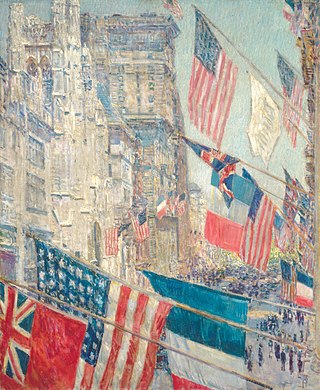
An alliance is a relationship among people, groups, or states that have joined together for mutual benefit or to achieve some common purpose, whether or not an explicit agreement has been worked out among them. Members of an alliance are called allies. Alliances form in many settings, including political alliances, military alliances, and business alliances. When the term is used in the context of war or armed struggle, such associations may also be called allied powers, especially when discussing World War I or World War II.
A United Nations General Assembly resolution is a decision or declaration voted on by all member states of the United Nations in the General Assembly.

United Nations General Assembly Resolution 3379, adopted on 10 November 1975, "Determines that Zionism is a form of racism and racial discrimination" with 72 votes in favour, 35 votes against, and 32 abstentions. It was revoked by Resolution 46/86, adopted on 16 December 1991 with 111 votes in favour, 25 votes against, and 13 abstentions. The vote for Resolution 3379 was held nearly one year after the adoption of Resolution 3236 and Resolution 3237: the former recognized the "Question of Palestine" and invited the Palestine Liberation Organization (PLO) to participate in international diplomacy; and the latter designated the PLO as a non-member Assembly observer following the "Olive Branch Speech" by Palestinian political leader Yasser Arafat.
Soviet anti-Zionism is an anti-Zionist and pro-Arab doctrine promulgated in the Soviet Union during the Cold War. While the Soviet Union initially pursued a pro-Zionist policy after World War II due to its perception that the Jewish state would be socialist and pro-Soviet, its outlook on the Arab–Israeli conflict changed as Israel began to develop a close relationship with the United States and aligned itself with the Western Bloc. Anti-Israel Soviet propaganda intensified after Israel's sweeping victory in the 1967 Arab–Israeli War, and it was officially sponsored by the agitation and propaganda media of the Communist Party of the Soviet Union as well as by the KGB. Among other charges, it alleged that Zionism was a form of racism. The Soviets framed their anti-Zionist propaganda in the guise of a study of modern Zionism, dubbed Zionology. The Soviet anti-Israel policy included the regulated denial of permission for Jews in the Soviet Union to emigrate, primarily to Israel, but also to any other country.
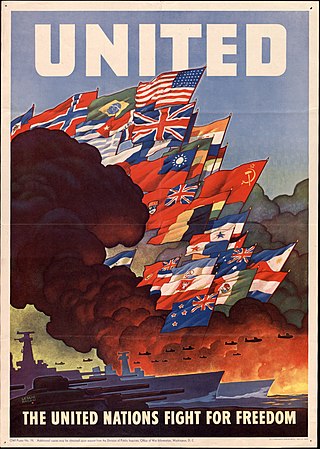
The Declaration by United Nations was the main treaty that formalized the Allies of World War II and was signed by 47 national governments between 1942 and 1945. On 1 January 1942, during the Arcadia Conference, the Allied "Big Four"—the United States, the United Kingdom, the Soviet Union, and China—signed a short document which later came to be known as the United Nations Declaration, and the next day the representatives of 22 other nations added their signatures.
New Nationalism was a policy platform first proposed by former President of the United States Theodore Roosevelt in a speech in Osawatomie, Kansas on August 31, 1910.

Greece and Serbia enjoy close diplomatic relations, which have traditionally been friendly due to cultural, religious and historical ties between the two nations.
The political status of Kosovo, also known as the Kosovo question, is the subject of a long-running political and territorial dispute between the Serbian government and the Government of Kosovo, stemming from the breakup of Yugoslavia (1991–92) and the ensuing Kosovo War (1998–99). In 1999, the administration of the Autonomous Province of Kosovo and Metohija was handed on an interim basis to the United Nations under the terms of UNSCR 1244 which ended the Kosovo conflict of that year. That resolution reaffirmed the territorial integrity of Serbia over Kosovo but required the UN administration to promote the establishment of 'substantial autonomy and self-government' for Kosovo pending a 'final settlement' for negotiation between the parties.

The Republic of Serbia was a constituent state of the Federal Republic of Yugoslavia between 1992 and 2003 and the State Union of Serbia and Montenegro from 2003 to 2006. With Montenegro's secession from the union with Serbia in June 2006, both became sovereign states in their own right for the first time in nearly 88 years.
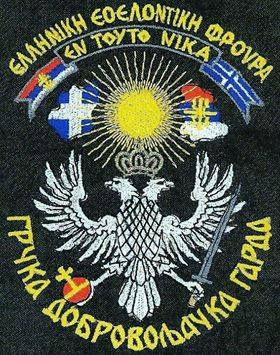
The Greek Volunteer Guard was a unit of Greek volunteers that fought in the Bosnian War on the side of the Army of the Republika Srpska. Some members of the unit are alleged to have been present in the area of the Srebrenica massacre and reportedly hoisted a Greek flag over the town, which was recorded 'for marketing purposes'.
Takis Michas is a Greek journalist and author who lives in Athens, where he works for the Greek daily Eleftherotypia and contributes to the Wall Street Journal Europe. He has written extensively about the Greek involvement in the Bosnian war, especially in the Srebrenica massacre.

The Palestinian–Serbian relations are bilateral relations between the State of Palestine and the Republic of Serbia. Relations between Serbia and Palestine have been very close and friendly.

The 1912 Progressive National Convention was held in August 1912. Angered at the renomination of President William Howard Taft over their candidate at the 1912 Republican National Convention, supporters of former President Theodore Roosevelt convened in Chicago and endorsed the formation of a national progressive party. When formally launched later that summer, the new Progressive Party acclaimed Roosevelt as its presidential nominee and Governor Hiram Johnson of California as his vice presidential running mate. When questioned by reporters, Roosevelt said he felt as strong as a "bull moose". Henceforth known as the "Bull Moose Party", the Progressives promised to increase federal regulation and protect the welfare of ordinary people.
Serbia joined the United Nations on November 1, 2000, as the Federal Republic of Yugoslavia. Originally the previous Yugoslav state was one of the original 51 member states of the United Nations.

Democratic Federal Yugoslavia was a charter member of the United Nations from its establishment in 1945 as the Socialist Federal Republic of Yugoslavia until 1992 during the Yugoslav Wars. During its existence the country played a prominent role in the promotion of multilateralism and narrowing of the Cold War divisions in which various UN bodies were perceived as important vehicles. Yugoslavia was elected a non-permanent member of the United Nations Security Council on multiple occasions in periods between 1950 and 1951, 1956, 1972–1973, and 1988–1989, which was in total 7 years of Yugoslav membership in the organization. The country was also one of 17 original members of the Special Committee on Decolonization.
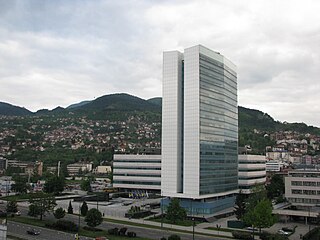
Greek reaction to the Yugoslav Wars refers to the geopolitical relations between Greece and the countries that emerged from the breakup of Yugoslavia as a result of the Yugoslav Wars as well as the international stance of the former during the years of the conflict in terms of activities by state and non-state actors . Despite any reactions, Greece allowed the NATO forces pass to the north.

The Non-Aligned Movement (NAM) is a forum of 120 countries that are not formally aligned with or against any major power bloc. It was founded with the view to advancing interests of developing countries in the context of Cold War confrontation. After the United Nations, it is the largest grouping of states worldwide.
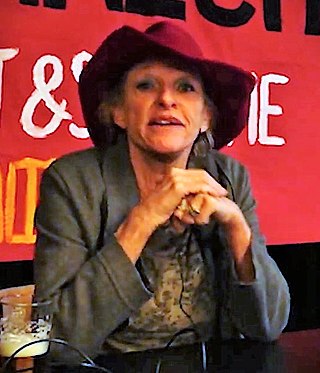
Ingeborg Beugel is a Dutch freelance correspondent. Based in Greece, she had to temporarily leave the country in November 2021 after publicly questioning the Greek Prime Minister about pushbacks in Greece.
References
- ↑ William Giles Dix, The Unholy Alliance: An American View of the War in the East, New York: Charles B. Norton, 1855.
- ↑ "CATHOLIC ENCYCLOPEDIA: Holy Alliance". www.newadvent.org.
- ↑ Theodore Roosevelt (August 1912). "Progressive covenant with the people". The Library of Congress. Thomas Edison . Retrieved 2010-05-29.
- ↑ Geoffrey K. Roberts, The Unholy Alliance: Stalin's Pact with Hitler. Indianapolis: Indiana University Press, 1989. Gerald Freund. Unholy Alliance: Russian-German Relations from the Treaty of Brest-Litovsk to the Treaty of Berlin. New York: Harcourt, Brace and Company, 1957.
- ↑ Department Of State. The Office of Electronic Information, Bureau of Public Affairs. "27. Intelligence Memorandum, Washington, January 29, 1969". 2001-2009.state.gov.
- ↑ African National Congress, "Cementing the Unholy Alliance: Statement in the Special Committee Against Apartheid, May 18, 1965". Archived from the original on 1 December 2008. Retrieved 2009-03-17.
{{cite web}}: CS1 maint: bot: original URL status unknown (link) - ↑ Eliakim M. Sibanda, The Zimbabwe African People's Union, 1961–87, p.128
- ↑ Sellström, Tor (1999). Sweden and national liberation in Southern Africa. Vol. 1, Formation of a popular opinion (1950-1970) (PDF). Uppsala: Nordiska Afrikainstitutet. p. 421. ISBN 91-7106-430-3. OCLC 41157147.
- ↑ CM/Res. 209 (XIV) "Resolution on Decolonization and Apartheid". Resolutions and Declarations..., March 1970. (see document in African Union link below).
- ↑ Cited in the text of United Nations General Assembly Resolution 3379 (XXX). Resolution "3151 (XXVIII). Policies of apartheid of the Government of South Africa", 14 December 1973: https://undocs.org/A/RES/3151(XXVIII)
- ↑ Michas, Takis (2002). Unholy Alliance: Greece and Milosevic's Serbia. College Station: ETexas A&M University Press. ISBN 978-1-58544-183-9.